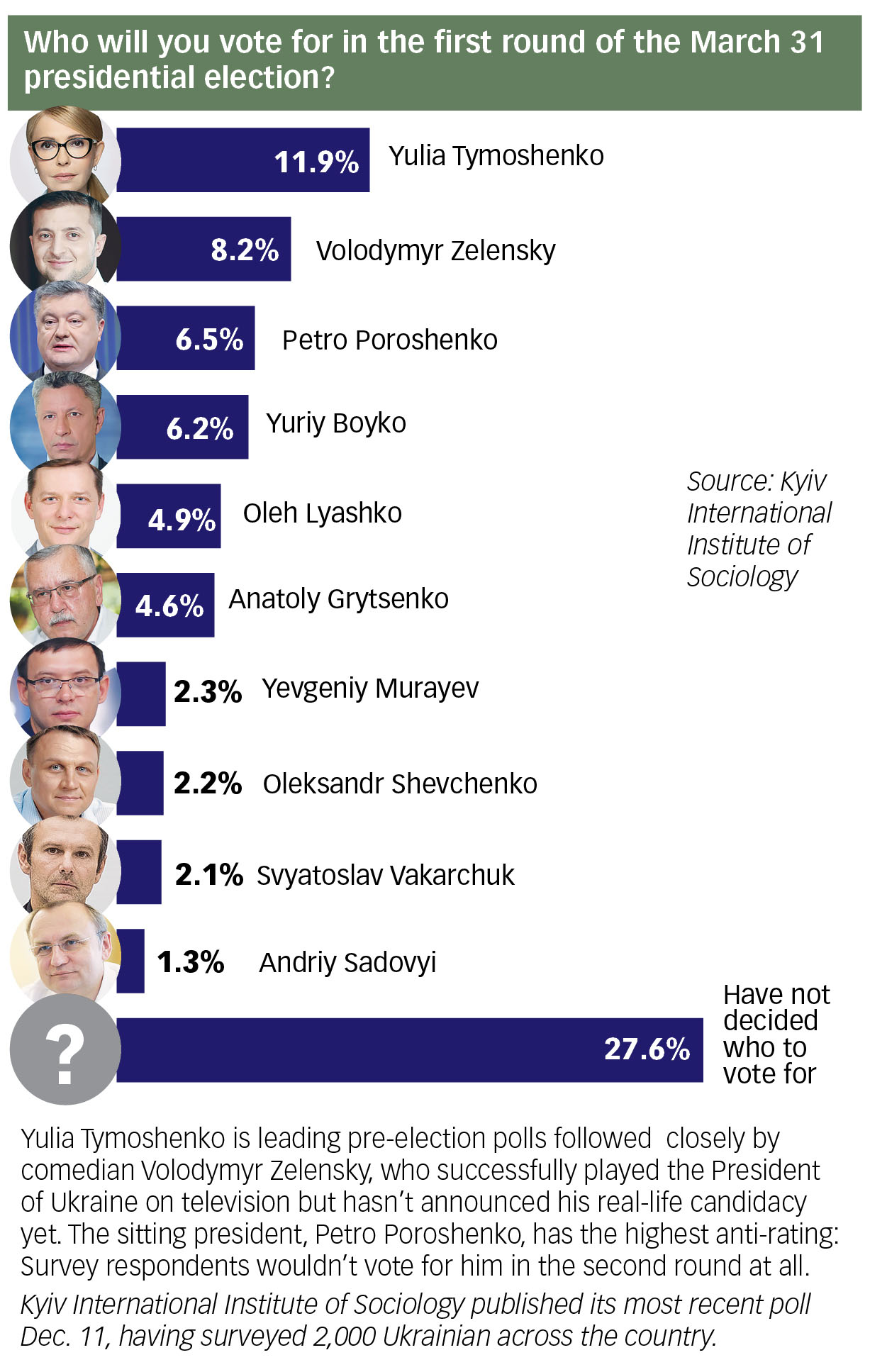Ukraine’s election frenzy will start on New Year’s Eve, with the official launch of the presidential election campaign in the March 31 vote.
If none of the candidates wins a majority of the votes, the two candidates with the most votes will go into a runoff election on April 21.
Only two of Ukraine’s five presidents have won election in the first round in independent Ukraine’s history: Leonid Kravchuk in 1991 and Petro Poroshenko in 2014.
One presidential election even triggered a revolution. In 2004, Viktor Yanukovych attempted to take power in a rigged Nov. 21 election that led to the Orange Revolution. The Supreme Court ordered a repeat of the runoff vote on Dec. 26, which Viktor Yushchenko won.
But Yanukovych made a stunning comeback to win the presidency in a Feb. 7, 2010, runoff election, defeating Yulia Tymoshenko, then prime minister, by less than 3.5 percentage points. His rule came to an ignominious end when he fled Ukraine on Feb. 22, 2014, after the EuroMaidan Revolution. On May, 25, 2014, Poroshenko easily defeated Tymoshenko in the first round of the election.
Key dates
- Dec. 31 — Feb. 3 — Nomination of candidates for president, and submission of candidacies to the Central Election Commission. Start of the election campaign.
- Feb. 8 — Candidate registration deadline and deadline for setting up an election fund account.
- Feb. 13 — Final list of candidates announced on the website of the Central Election Commission and in the parliamentary and government newspapers.
- March 8 — Deadline for withdrawal of candidacies.
- March 29 — End of the election campaign.
- March 30 — Day of silence — no campaigning or release of poll results permitted.
- March 31 — Election Day.
- April 10 — Deadline for announcing election results.
- April 21 — Runoff election (if required).
- May 1 — Deadline for announcing runoff election results.
- June 3 — Deadline for presidential inauguration in parliament.
How many voters?
As of Nov. 30, the State Registry of Voters estimates there are 35,622,943 Ukrainian voters, including over half a million voters registered abroad.
The Central Election Commission has simplified the voting procedure for Ukrainian citizens who have fled the Russian-occupied parts of Luhansk and Donetsk oblasts and Crimea: They no longer have to provide proof of why they have to vote in a different polling station.
According to the latest official numbers, there are 1.5 million internally displaced people in Ukraine.
Who is eligible to run?
A presidential candidate must be a Ukrainian citizen aged 35 years or older. They must speak the Ukrainian language and have permanently resided in Ukraine for 10 years prior to Election Day.
A candidate can be a self-nominee or nominated by a political party. A person can be the president of Ukraine for no more than two consecutive terms.
Besides submitting their applications to the Central Election Commission, all candidates for the office of president must file a declaration of income and assets for 2018, which will be audited by the National Agency for Corruption Prevention.
Every candidate also must provide a deposit Hr 2.5 million ($89,000) to the Central Election Commission. The election winner and runoff candidate receive their money back. The other funds collected as deposits go to the state budget after the election.
Campaign financing
A candidate may officially start campaigning on the next day after they register with the Central Election Commission. They also must establish an election fund and open a bank account in hryvnias.
A campaign election fund can include a candidate’s private funds as well as funds of the political party that nominated the candidate.
Fundraising is allowed but restricted. Individuals may donate a total of Hr 1.67 million ($59,444); legal entities can donate twice as much.
Foreigners and charity funds are forbidden to support candidates financially.
All candidates must file two financial reports for their campaign election funds with the National Agency for Corruption Prevention: the interim report is due on March 25, and the final report is due on April 14.
The most expensive election campaign in Ukraine’s history was the 2004 one: Yanukovych’s campaign office reportedly spent close to $1 billion, while Yushchenko’s spent $400 million. It was also the dirtiest political race, with vote buying, the near-fatal dioxin poisoning of Yushchenko and the failed attempt to rig the vote count.
How many candidates?
As many as 22 candidates are expected to enter the race. Some are considered secret fronts for others, designed to siphon votes from rivals. Among them:
Roman Bezsmertnyi, former lawmaker and ambassador, Agrarian Party
Olha Bohomolets, member of parliament, Petro Poroshenko Bloc
Yuriy Boyko, member of parliament, Opposition Platform — Za Zhittya
Yuriy Derevyanko, member of parliament, the Movement of New Forces
Dmytro Dobrodomov, member of parliament, People’s Control
Dmytro Gnap, investigative journalist
Anatoliy Grytsenko, ex-defense minister, Civil Position
Ruslan Koshulynskyi, member of Lviv Oblast Council, All-Ukrainian Union Svoboda
Oleg Lyashko, member of parliament, Radical Party
Yevhen Murayev, member of parliament, Nashi
Valentyn Nalyvaychenko, ex-head of Security Service of Ukraine, Spravedlivist
Roman Nasirov, former head of State Fiscal Service
Andriy Sadovyi, mayor of Lviv, Samopomich
Oleksandr Shevchenko, member of parliament, Ukrainian Alliance of Patriots
Ihor Shevchenko, lawyer, former minister of ecology
Serhiy Taruta, member of parliament, Osnova
Yulia Tymoshenko, member of parliament, Batkivshchyna
Arseniy Yatsenyuk, ex-prime minister, People’s Front.

The respondents were offered eight pairs of possible candidates in the runoff election and asked who they would vote for.
Yulia Tymoshenko 23.4% vs 11.8% Petro Poroshenko
Yuriy Boyko 19% vs 15.3% Petro Poroshenko
Yulia Tymoshenko 20.8% vs 20.4% Anatoly Grytsenko
Yulia Tymoshenko 23.4% vs 18.9% Yuriy Boyko
Yulia Tymoshenko 23.4% vs 18.9% Svyatoslav Vakarchuk
Volodymyr Zelensky 23% vs 22.2% Yulia Tymoshenko
Svyatoslav Vakarchuk 24.2% vs 11.1% Petro Poroshenko
Volodymyr Zelensky 27.8% vs 12.2% Petro Poroshenko
These four are expected to run:
Andriy Biletskiy, member of parliament, National Corps
Petro Poroshenko, president, Solidarnist
Svyatoslav Vakarchuk, Okean Elzy lead singer
Volodymyr Zelensky, comedy actor
